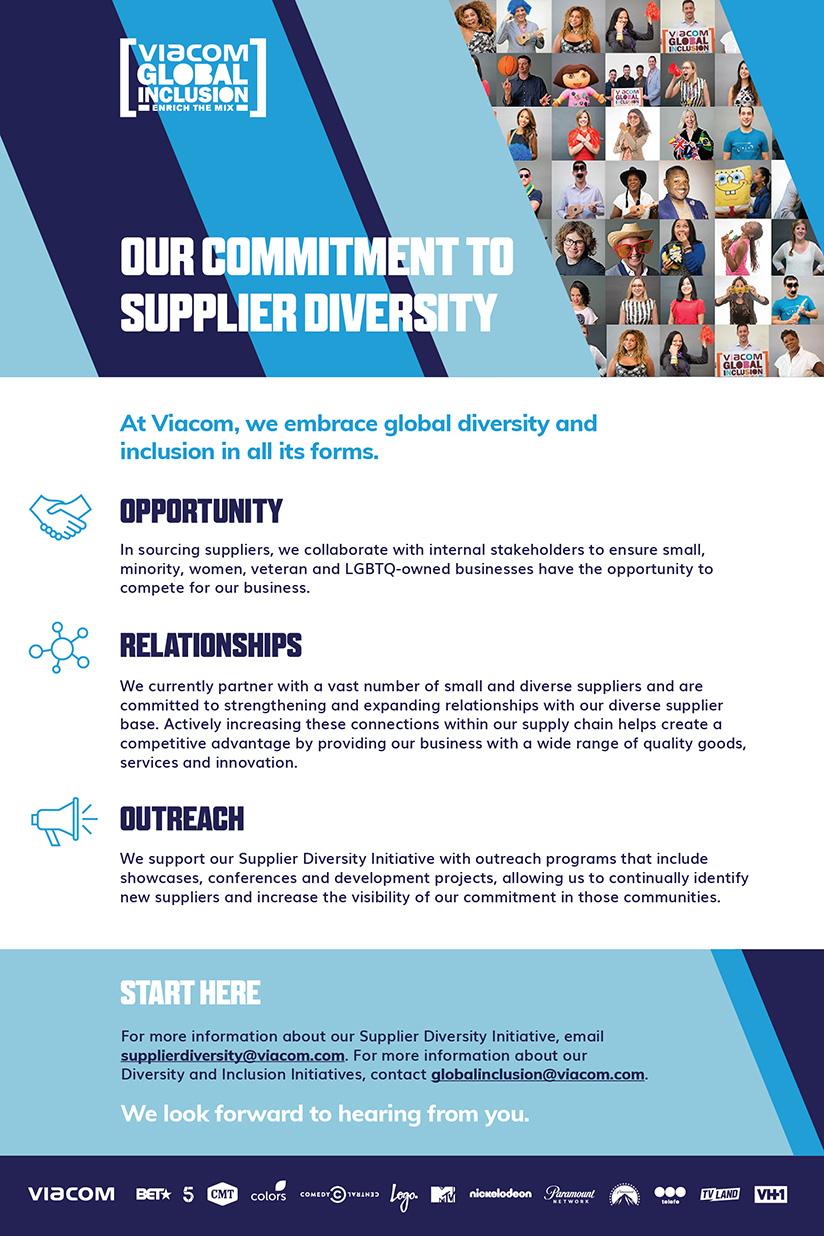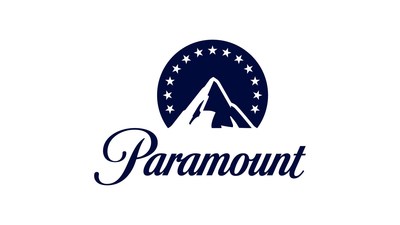Viacom Diversifies Vendor Pool, Echoing Internal Culture
by Stuart Winchester

Originally published on Blog.Viacom
Viacom content rolls from screens across more than 180 countries and in dozens of languages, reaching more than 4 billion subscribers. Every single piece of this content is the result of dozens or hundreds or thousands of workers who do everything from directing to producing to lighting to catering to set design – and most of them do not work directly for Viacom; they work for independent companies, vendors that Viacom contracts to execute the particulars of production or logistics or supply delivery.
This enormous footprint presents Viacom with an equally enormous opportunity: to proactively seek out diverse suppliers, echoing the company’s varied programming and strong internal culture of diversity and inclusion.
Under the company’s new supplier diversity initiative, led by Viacom’s sourcing team and its Office of Global Inclusion, the company is doing exactly that, actively forming new partnerships that are broadening opportunities for minority-owned shops while bolstering Viacom’s own business by offering a wider array of creative perspectives.
“When you look at the amount of spend we generate both through media networks and Paramount, it’s an incredible opportunity to diversify our partnership base,” said Viacom Executive Vice President and Global Head of Inclusion Strategies Marva Smalls.
Identifying diverse partners
The first step to diversification was to simply catalogue Viacom’s current vendor pool, a massive undertaking. Aside from changing internal procedures to document whether incoming vendors are diverse, Viacom joined several minority-focused councils that work with certified (meaning the businesses are at least 51 percent minority-owned) suppliers: the women’s business council WBENC, the LGBT business advocates NGLCC, minority supplier group NMSDC, and disabled veterans business representatives Disability:IN (formerly USBLN). So far, approximately 1,100 of Viacom’s vendors have either self-classified themselves as diverse or fit into the rubric to be certified by one of these organizations.
The reach of these certifying councils is substantial. The National LGBT Chamber of Commerce (NGLCC), for example, which claims to represent the interests of more than 1 million LGBT U.S. business owners, which it can connect with Viacom via networking events and access to its deep database.
Viacom’s goal is to form long-term, immersive partnerships with each organization, underscoring for their members the company’s sustained commitment to diversity. Building such a network also creates an echo affect, a sort of street cred where partner companies validate Viacom’s commitment not just to diversity, but to supporting the small businesses that most of these operations are.
“If you have that local production company that says, ‘I’m in business with Viacom, and as a result, that allows me to hire more people for my community and where I’m located,’ ultimately, the community will see that,” said Smalls. “We need to be viewed as a company that’s not just taking up space in the community, but actually taking the time to identify small businesses.”
Viacom is also coordinating with its peers to identify minority-owned businesses. Last year, Viacom co-hosted a networking event with Disney, Time Warner, CBS, NBCU and others, during which minority-owned vendors could meet representatives of many large companies at once.
Sometimes a nudge is all you need
One initial contract with a major corporation can be the catalyst for tremendous growth. “The whole purpose behind vendor diversity is to help put a seat at the table for the new, innovative company who deserves a fair shot,” said Senior Vice President and former director for NGLCC New York (and former Logo personality) Jonathan Lovitz. “Our partners at all of our organizations that advocate for diverse-owned companies can each point to the day everything changed for a small business because they earned a chance to be seen by an inclusive industry leader like Viacom.”
Take, for example, Jax Media, a New York City-based, minority-owned production shop. The company parlayed a single off-the-air Comedy Central presentation a decade ago into production of multiple series for the network, including hit series Broad City. The company also produces TV Land’s Younger and has collaborated with MTV and Paramount Network.
“We make sure there is an eye toward creating a diverse culture and environment,” said Megan Ring, senior vice president and head of production for Comedy Central and senior vice president of scripted production for Paramount Network and TV Land. “Jax Media’s owner, Tony Hernandez, was just a producer in New York with some great ideas and a different way of thinking. We struck up a relationship and we were willing to take some chances to learn from him, and he was at the same time able to take advantage of access points to Viacom.”
Nickelodeon similarly points to the experience of Ne’e Leau, the Samoan-American owner of Scenic Storage in Los Angeles, who started as a stagehand with Nick 20 years ago. His business now manages the bulk of the network’s set storage in the city.
“Ne’e’s experience shows how the diversity movement can work,” said Nickelodeon Executive Vice President of Production Lee Ann Larsen. “We started with the intent to have a lot of diverse people in the company, and then as those people grow in their careers, they start their own companies, and it blossoms into something more for that individual and for the company.”
While both Nickelodeon and Comedy Central established these relationships prior to Viacom formalizing its vendor diversity program, the rise of their vendors from bit player to lead actor demonstrates the power of investing in a diverse workforce.
The business case
One of the core purposes of Viacom’s sourcing organization is to drive either the price or volume of products or services lower. Diversity, as it turns out, is a highly effective way to achieve this.
“Yes, we are giving these suppliers, who are generally smaller in size, an opportunity to grow their businesses,” said Tom Lardieri, senior vice president of Financial Operations. “There’s an economic benefit to the system, certainly to the diverse supplier, but by bringing in a diverse supplier base, it allows us to drive better service, better quality, better price.”
A company creating content for diverse audiences also benefits substantially from diverse talent creating that content. “We all have our own life experiences, and very often individuals may associate with individuals who are similar to them,” says Paramount Pictures COO Andrew Gumpert. “But if we have a room with women and men representing an array of perspectives, identities and cultural backgrounds, we’re going to get a unique point of view that produces the best result.”
Diversity does not mean sacrificing quality, however, and Viacom’s focus remains firmly on identifying the best available talent. “The BET pool of talent comes from all walks of life,” said BET Senior Vice President of Production Michael Siegman. “Yes, we should have more diversity overall and we should open our sites. We strive to hire people because they bring distinctive skillsets and priorities that help us on all of our productions.”
Defining the company beyond the bottom line
Viacom hopes to incrementally increase its number of diverse vendors, underscoring the importance of broad inclusivity to the company’s business plan.
“It’s imperative for this business to define itself more broadly than just the bottom line,” said Lardieri. “People want to know what a company stands for.”
Indeed, the vendor diversity effort largely echoes the larger Viacom culture. Viacom has spent years curating a strong internal culture of diversity and inclusion, led by Smalls, who says that Viacom’s employee resource groups are often used as a model for companies that want to institute such programs. “We’re not just fostering an environment of inclusion, we’re fostering an environment of belonging, where people feel they’re supposed to be here,” she said.
“Viacom is very much in the business of diversity,” continued Smalls. “Viacom is not a status quo company. We are not a cookie-cutter company. We’re not just a check-the-box, formulaic kind of company. We want to be at the forefront of driving for a more inclusive environment. We want to champion not just diversity, but we want to reflect the multiculturalism of the world and the people and the product that’s out there, and we want to create a place of inclusion, to be a committed custodian of change and diversity and helping to uplift communities that otherwise are underrepresented.”

